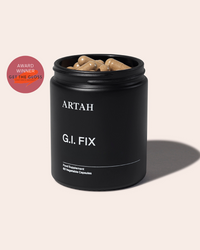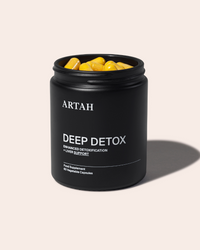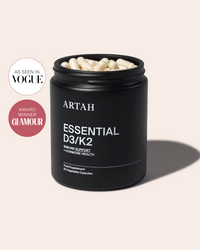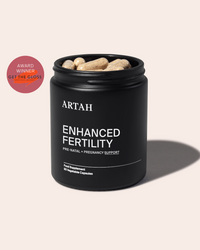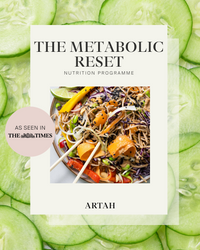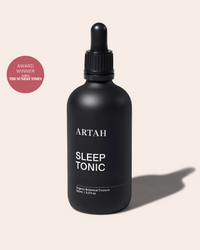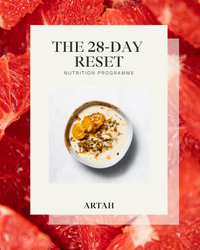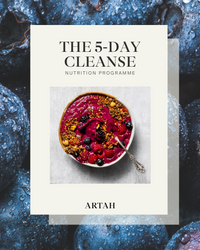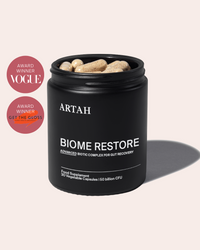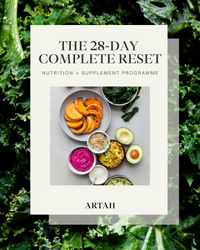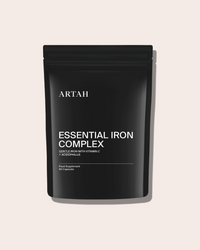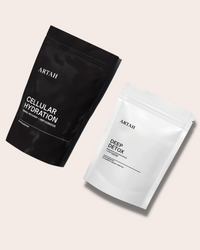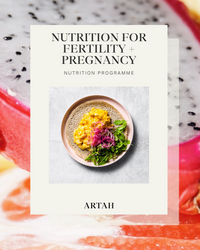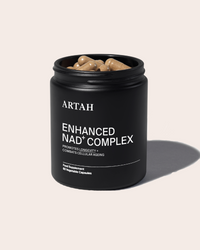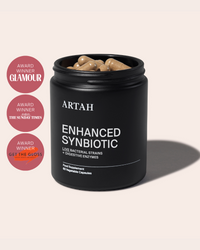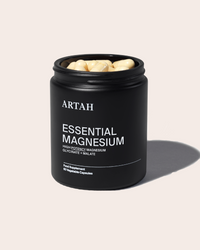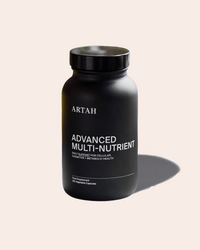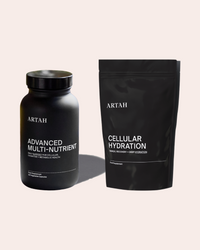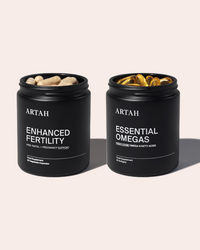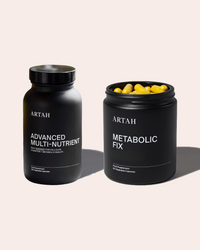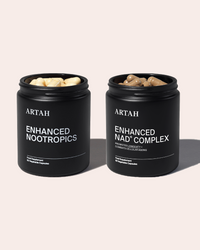What Is 'Inflammageing'?
The typical signs of ageing, like wrinkles and age-related conditions, such as diabetes and dementia, are not necessarily predetermined by our genetics. Family studies have shown that only 25% are caused by genetics – most of which we can switch on and off through our environment, while the other 75% are lifestyle related(1). According to the Nature Journal, chronic inflammation causes accelerated ageing, which is a process known as ‘inflammageing’(2). While inflammation is a natural response to injury and infection, prolonged inflammation over an extended period becomes chronic. This low-grade inflammation may not exhibit immediate symptoms, but its presence intensifies with age, influencing the immune system and contributing to accelerated cellular ageing(3).
What Lifestyle Factors Contribute To Chronic Inflammation And How Does It Lead To Ageing?
DIET AND THE GUT
The Western diet is linked to increased consumption of saturated fats, ultra-processed foods, and refined sugars(4). Elevated levels of saturated fat in the diet can activate our immune cells(4), triggering the release of inflammatory substances. Additionally, a diet rich in ultra-processed food disrupts the balance of the gut microbiota, leading to an elevated ratio of harmful bacteria(5). This microbial imbalance (‘dysbiosis’) triggers an inflammatory state, compromising the integrity of our gut lining, resulting in increased permeability of the gut and skin microbiomes. Specifically, stressors to the skin barrier can initiate inflammation, exacerbating age-related skin symptoms such as age spots and wrinkles(6).
ENVIRONMENTAL TOXINS
Inflammation that leads directly to the ageing of cells can also arise from the accumulation of environmental toxins, or 'gerontogens,' in the body over time(7). These pollutants include substances such as cigarette smoke, food additives, pollution, and specific pesticides like glyphosate(7). Unequal exposure to ‘gerontogens’ can result in individuals aging at different rates as they cause cellular stress that may lead to cellular senescence(8). Cell senescence is where cells become unable to resume their typical growth and division cycle for cell regeneration. Senescent cells can release inflammatory cytokines, contributing to a chronic inflammatory response, accelerating the ageing of cells, explains Nutritionist and researcher Laura Jennings.
HORMONES
Hormones have a profound impact on inflammation, particularly in the context of ageing. Consistently high levels of the stress hormone cortisol results in an accumulation of our stress hormones and an increased production of inflammatory cytokines like interleukin-6 (IL-6) and tumour necrosis factor-alpha (TNF-alpha)(9). Increased stress is associated with a higher likelihood of elevated IL-6 levels, which is linked to age-related neurological and physical conditions like Alzheimer's disease, osteoporosis, and rheumatoid arthritis(10).
Reduced levels of sex hormones like estrogen and testosterone lead to inflammation, affecting ageing aspects like bone health, muscle mass, and cognitive function(11). A decline in estrogen speeds up muscle loss and weakness (‘sarcopenia’), causing physical frailty(11). Estrogen is crucial for skin thickness and collagen production, and its decrease contributes to visible signs of ageing, such as fine lines and wrinkles(12).
NEW INFLAMMATORY INSIGHTS: MOOD, METABOLISM AND ENERGY
There is now clinical evidence that depression serves as an early sign of dementia even before noticeable signs appear in older individuals(13). The shift from depression to dementia is believed to follow the progression of low-grade inflammation(13). Depressive inflammation activates immune cells, triggering inflammatory signals such as prostaglandin and nitric oxide(14). This sets off a chain reaction of increased inflammation, ultimately leading to further cognitive decline(14).
According to a review in Nature Cardiology, chronic inflammation is also a risk factor for diabetes(14). Inflammation can interfere with how insulin regulates blood sugar, resulting in elevated blood glucose levels and excess insulin. Insulin is known to have pro-inflammatory effects, and when it is present in abundance, it may trigger more inflammatory pathways in the body(14). This inflammation is linked to oxidative stress and the production of free radicals, which can accelerate the aging process at the cellular level, contributing to age-related conditions, such as, cardiovascular disease, neurodegenerative disorders and metabolic dysfunction.
Inflammation disrupts the production of neurotransmitters like dopamine and serotonin, which triggers behavioural changes, known as sickness behaviour(15). This includes fatigue, decreased activity, altered mood, cognitive changes and reduced appetite(15). The natural age-related increase in cytokines or ‘inflammageing’ provides an explanation for the observed changes in appetite, cognitive functioning, and energy levels associated with ageing.
Can We Control The Ageing Process And How Can We Address "Inflammageing"?
Controlling ‘inflammageing’ is a promising strategy to slow the decline of health that occurs with ageing. While exposure to ultra-processed foods, environmental toxins and stress might seem unavoidable, there are specific lifestyle choices we can make that will greatly reduce age-related inflammation.
CALORIE RESTRICTION
Calorie restriction is linked to reduced inflammatory markers and a decrease in oxidative stress(14). Practices such as fasting, time-restricted eating, and reducing snack frequency all contribute to a lower calorie intake overall(14). These approaches have demonstrated effects on the microbiota, leading to reduced inflammation and enhanced resilience of the gut barrier(14).
PRIORITISE WHOLE FOODS
As beneficial gut bacteria decline with age, it's crucial to prioritise fibrous whole foods that boost the population of beneficial microbes in our gut and enhance the production of short-chain fatty acids, known for their anti-inflammatory effects(14). In those undergoing healthy ageing, a flourishing gut microbiota includes helpful bacteria such as Akkermansia and Bifidobacterium(14). These bacteria contribute to a strong immune system, possess anti-inflammatory qualities and help maintain metabolic balance.
REGULAR EXERCISE
Regular exercise exerts anti-inflammatory effects, attributed in part to its enhancement of insulin sensitivity. Additionally, it promotes healthier muscles and mitigates the risk of age-related muscle loss(16). The saying holds true when it comes to muscle: if you don’t use it, you lose it!
ADEQUATE SLEEP
During sleep, a cleansing process occurs in our brain, removing harmful molecules linked to neurodegeneration, which is essentially the deterioration of the brain. Insufficient sleep means we miss out on the full cleansing effect from our glymphatic system, leading to toxicity and inflammation. Sleeping 7-9 hours slows cognitive decline and age-related inflammation(17).
STAY SOCIAL
Establishing robust social connections has been demonstrated to reduce our blood pressure and enhance longevity. The absence of social ties stands as an independent risk factor for cognitive decline. The support of family and friends has been proven to reduce our inflammation levels(18).
AVOID TOXINS
Avoid environmental toxins where possible, for instance, choosing not to smoke and opting to cook from scratch helps minimise exposure to pollutants like cigarette smoke and additives. Washing fruits and vegetables thoroughly helps minimise the risk of ingesting pesticides, preventing cell senescence.
Disclaimer: The information is presented in this article is for educational purposes only and is not intended to diagnose, prevent, or treat any medical or psychological conditions. The information is not intended as medical advice, nor should it replace the advice from a doctor or qualified healthcare professional. Please do not stop, adjust, or modify your dose of any prescribed medications without the direct supervision of your healthcare practitioner.
REFERENCES
- Passarino G, De Rango F, Montesanto A. Human longevity: Genetics or Lifestyle? It takes two to tango. Immun Ageing. 2016. 5;13:12.
- Li, X., Li, C., Zhang, W. et al. Inflammation and aging: signaling pathways and intervention therapies. Sig Transduct Target Ther. 2023, 8, 239.
- Pahwa R, Goyal A, Jialal I. Chronic Inflammation. Stat Pearls, National Library of Medicine. 2023.
- Clemente-Suárez VJ, Beltrán-Velasco AI, Redondo-Flórez L, Martín-Rodríguez A, Tornero-Aguilera JF. Global Impacts of Western Diet and Its Effects on Metabolism and Health: A Narrative Review. Nutrients. 2023. 14;15(12):2749.
- Safadi, J.M., Quinton, A.M.G., Lennox, B.R. et al. Gut dysbiosis in severe mental illness and chronic fatigue: a novel trans-diagnostic construct? A systematic review and meta-analysis. Mol Psychiatry. 2022 27, 141–153 (2022).
- Lee HJ, Lee SH. Epidermal permeability barrier defects and barrier repair therapy in atopic dermatitis. Allergy Asthma Immunol Res. 2014.6(4):276-87.
- Misra BB. The Chemical Exposome of Human Aging. Front Genet. 2020. 23;11:574936.
- Sorrentino JA, Sanoff HK, Sharpless NE. Defining the Toxicology of Aging. Trends in Molecular Medicine, 2014.
- Morey JN, Boggero IA, Scott AB, Segerstrom SC. Current Directions in Stress and Human Immune Function. Curr Opin Psychol. 2015. 1;5:13-17.
- Lavretsky H, Newhouse PA. Stress, inflammation, and aging. Am J Geriatr Psychiatry. 2012. 20(9):729-33.
- Horstman AM, E. Dillon EL, Urban R, Sheffield-Moore M. The Role of Androgens and Estrogens on Healthy Aging and Longevity, The Journals of Gerontology. 2012; 67(11) 1140–1152
- Stevenson S, Thornton J. Effect of estrogens on skin aging and the potential role of SERMs. Clin Interv Aging. 2007;2(3):283-97.
- Leonard BE. Inflammation, depression and dementia: are they connected? Neurochem Res. 2007.32(10):1749-56.
- Ferrucci L, Fabbri E. Inflammageing: chronic inflammation in ageing, cardiovascular disease, and frailty. Nat Rev Cardiol. 2018;15(9):505-522.
- Karshikoff B, Sundelin T, Lasselin J. Role of Inflammation in Human Fatigue: Relevance of Multidimensional Assessments and Potential Neuronal Mechanisms. Front Immunol. 2017. 20;8:21.
- Rivas D.A, Fielding R.A. Skeletal muscle is a highly malleable tissue that is a central factor in whole-body health and is essential for maintaining energy homeostasis. Skeletal Muscle. Skeletal Muscle. 2013.
- Mullington JM, Simpson NS, Meier-Ewert HK, Haack M. Sleep loss and inflammation. Best Pract Res Clin Endocrinol Metab. 2010. 24(5):775-84.
- Yang YC, Schorpp K, Harris KM. Social support, social strain and inflammation: evidence from a national longitudinal study of U.S. adults. Soc Sci Med. 2014.107:124-35.








